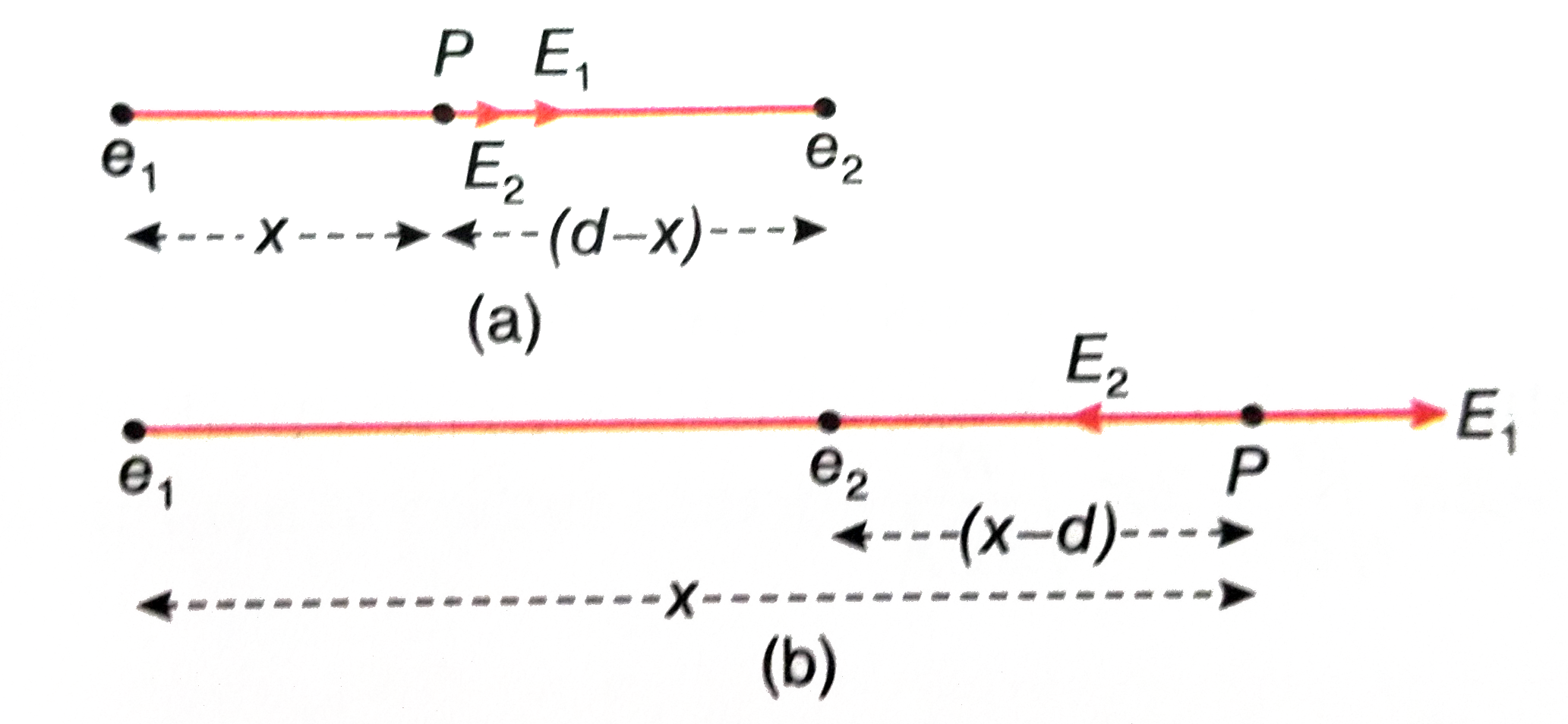Two point charges and are separated by a distance but the electric field is not on any point joining the two points. What can be concluded from this? Solution in Bengali
In the first case, let the distance of point P from is x and from is (d - x)

Electric field at P due to
Electric field at P due to
If and are oppositely charged, then the directions of and at point P will be the same and their resultant field,
In this case, E will never be zero.
In the second case, let the distance of point P from is x and from is (x - d)
In this case,
If are oppositely charged. will act along the opposite directions.
Resultant electirc field,
In this case, if then will always be unequal.
E will never be zero.
Therefore, if the electric field is not zero at any point, then are equal and opposite in nature, i.e., .
Topper's Solved these Questions
- ELECTRIC FIELDBook:CHHAYA PUBLICATIONChapter:ELECTRIC FIELDExercise:NCERT TEXTBOOK QUESTIONS WITH ANSWER HINT
Explore 24 Videos
- ELECTRIC FIELDBook:CHHAYA PUBLICATIONChapter:ELECTRIC FIELDExercise:NCERT EXEMPLAR QUESTIONS WITH ANSWER HINT
Explore 7 Videos
- ELECTRIC FIELDBook:CHHAYA PUBLICATIONChapter:ELECTRIC FIELDExercise:SECTION RELATION QUESTIONS
Explore 50 Videos
- ELECTRIC ENERGY AND POWERBook:CHHAYA PUBLICATIONChapter:ELECTRIC ENERGY AND POWERExercise:CBSE SCANNER
Explore 7 Videos
- ELECTRIC POTENTIAL Book:CHHAYA PUBLICATIONChapter:ELECTRIC POTENTIAL Exercise:CBSE Scanner
Explore 13 Videos
Similar Questions
An electrostatic field is a continuous curve. That is, a field line cannot have sudden breaks. Why not?
View SolutionThe electric flux through the surface

View SolutionState Coulomb's law regarding the force of interaction between two point charge. Define the unit of charge from this law.
View SolutionA light bulb is rated 100 W for 220 V ac supply of 50 Hz. Calculate
the resistance of the bulb ,
View SolutionA test charge q is moved without acceleration along the path from A to B from B to C in electric field E as shown in fig.

(i) Calculate the potential difference between A and C.
View SolutionThe maximum electric field at a point on the axis of a uniformly charged ring is E_(0) . At how many points on the axis will the magnitude of the electric field be E_(0)//2 .
View SolutionThe maximum electric field at a point on the axis a uniformly charged ring is E0. At how many points on the axis will be magnitude of electric field be E0/2
View Solutionदो बिंदु-आवेश +q व −q परस्पर d दूरी पर स्थित है। किन बिन्दुओ पर परिणामी वैद्युत क्षेत्र दोनों आवेशों को मिलाने वाली रेखा के समांतर होगा?
View Solutionदो बिंदु-आवेशों के बीच, उन्हें मिलाने वाली रेखा के किसी बिंदु पर वैद्युत क्षेत्र शून्य है। इससे आप आवेशों के संबंध में क्या निष्कर्ष निकाल सकते है?
View SolutionTwo point charges of 1muC and -1muC are separated by a distance of 100 Å. A point P is at a distance of 10 cm from the midpoint and on the perpendicular bisector of the line joining the two charges. The electric field at P will be
View SolutionTwo charges, +qand−q are separated by a distance d. At which points will the resultant electric field intensity be directed parallel to the line joining the charges ?
View SolutionTwo point charges are separated by a certain distance. Electric field intensity is zero at a point in between the two charges. What can we conclude about the charges ?
View SolutionTwo point charges e1 and e2 are placed at a distance d from each other. In between them there is no point where electric field is zero. From this what conclusion can you draw ?
View SolutionTwo point charges of 5μC and 20μC are separated by a distance of 2m. Find the point on the line joining them at which electric field intensity is zero.
View SolutionIn the following figure, point A is a distance L away from a point charge Q. point B is a distance 4L away from Q. What is the ratio of the electric field at B to that at A, EB/EA ?

View Solution